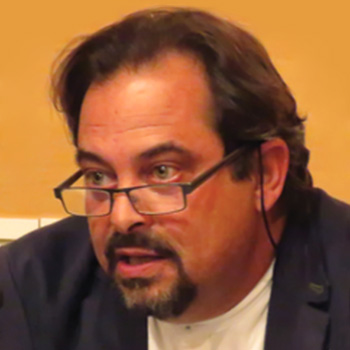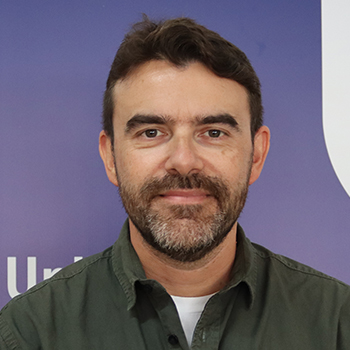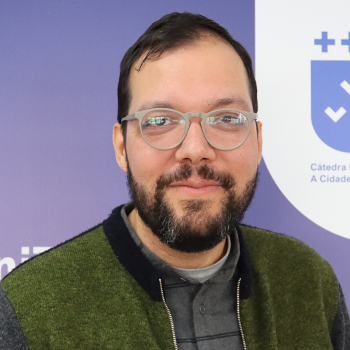WG2 Territory, Identity and Citizenship
Researches the relationship between territory, education and the potential and challenges of urban spaces/territories. It focuses on socio-territorial inequalities, citizenship and expressions of ethnic and cultural diversity in the city and its territories. In this sense, it aims to map, in dialogical interactions, the socio-territorial experiences of the various subjects, their practices in space and their educational outcomes, in the context of formal, non-formal and informal education, as well as the pedagogical activation of the city as an educational agent.
Coordination

Paulo Louro
Instituto Politécnico Nova Esperança (Guiné Bissau)
Researchers
Isabel Baltazar has a Bachelor's Degree in Philosophy from the Portuguese Catholic University (Lisbon, 1988), a Master's in Cultural and Political History (1995) from the Faculty of Social Sciences and Humanities of the NOVA University of Lisbon, and a PhD in History and Theory of Ideas, specializing in the History of Political Ideas (2008), from the same University, with a thesis titled "Portugal and the Idea of Europe. Contemporary Thought".
Her interest in European Studies was furthered by a postgraduate course in European Studies at the Faculty of Law of the University of Coimbra (1995). She carried out post-doctoral research (FCT) on "Europe in Portuguese Diplomacy. A comparative view between wars."
She was an Assistant Professor at the Portuguese Catholic University (Leiria Campus) and a Visiting Professor at the Faculty of Social Sciences and Humanities, in the Department of Political Studies, where she taught European Construction on the Master's Degree in Political Science and International Relations, specializing in European Studies.
She is a researcher at the Institute of Contemporary History (IHC) of the Faculty of Social Sciences and Humanities of NOVA University Lisbon and at theCenter for Interdisciplinary Studies of the 20th Century (CEIS 20) of the University of Coimbra.
She is a coordinating professor at ISEC Lisbon and coordinates the UNESCO Chair "The City that Educates and Transforms".
Email: isabel.baltazar@iseclisboa.ptCoordinator of the Letters Studies at the University of Passo Fundo (RS). He holds a Master's Degree in Literary Theory (1998), a PhD in Literary Theory (2002), both from PUCRS, and a Post-Doctorate from the University of Santiago de Compostela (2014). He is a senior professor (III) in the Undergraduate, Master's and Doctorate Programs in Letters at the University of Passo Fundo. He also coordinates the Author's Literary Collection (ALJOG/UPF), as well as developing projects in the "Reading and Reader Training" and "Production and reception of the literary text" lines of research, focusing his work on the subject of reading in relation to digital languages and contemporary literature. In addition, he is also the leader of the CNPq Research Group: Reading and literary collection'' and is part of the coordination of the Passo Fundo Literary Days. He was a CNPq researcher (PQ-2 grant) between 2019 and 2021.
Ana Patrícia Almeida completed her PhD in Education, in the field of Educational Administration and Policy, in 2015 at the Institute of Education of the University of Lisbon. She completed her Master's Degree in Educational Administration in 2005 from the FPCE of the University of Lisbon, and her Bachelor's Degree in Educational Sciences - Educational Administration in 1999 from the FPCE of the University of Lisbon. At the Higher Institute of Education and Sciences (ISEC Lisboa), she was Director of the School of Education and Human Development. She is currently an Assistant Professor at Universidade Aberta, and coordinates the Master's Degree in Educational Administration and Management. She is also the Head Researcher, at the same institution, of the UNESCO Chair "City that Educates and Transforms". She has received 2 awards, one of them for Best PhD Thesis in the field, in 2015. Professor Almeida has also published and conducted research in the fields of Public Education Policies, Educational Administration and Teacher Training.
Email: anap.almeida@uab.ptCláudia Neves has been an assistant professor at Universidade Aberta since 2010, where she teaches curricular units in the Department of Education and Distance Learning. Since 2013, she has been a member of the coordination team for the Master's Degree in Educational Administration and Management, where she has supervised several dissertations. Her experience also included teaching at FCSH/UNL in 2010/2012. She is currently the Portuguese coordinator of the European Union's Horizon-funded project titled "Transforming Education through Aesthetic and Embodied Learning for Democracy-as-becoming". Her research interests are rooted in the Laboratory of Education and Distance Learning (LE@D) and center around Educational Policies and new forms of regulation of education in the national and international framework, with special emphasis on the role of the European Union in defining the educational policy of its member states. Currently, her research seeks to explore and deepen training scenarios in digital environments especially oriented towards the management and leadership of schools in Portugal and Europe and the exploration of complexity theories in educational administration and management. In terms of training, she has a PhD in Education Sciences, specializing in Education and Development from FCT/UNL (2009) and a Master's Degree in Education and Society from ISCTE-Instituto Universitário de Lisboa. In 2000 she completed a Bachelor's Degree in Social Policy at the Universidade Técnica de Lisboa - Instituto Superior de Ciências Sociais e Políticas. She is a member of IGEC's team of experts in the 3rd cycle of external evaluation of Portuguese schools and has held various positions at said University. She has experience of coordinating European projects, particularly related to lifelong learning in SMEs and European History and Citizenship for teachers at all levels of education. The research projects in which she has participated as a member deal with various themes such as MOOCs, Interfaces between Higher Education and other institutions, and the Employability of University Alumni. She is currently a board member of the Portuguese Forum for Educational Administration and a member of the LE@D coordinating council. At LE@D she is the coordinator of a research line and is dedicated to research projects on Complexity Theories in the analysis of political contexts, Digital Educational Leadership and Virtual Learning Communities in schools.
Email: claudia.neves@uab.ptPedagogue, Master's and PhD in Education from the Faculty of Education of the Federal University of Minas Gerais (FaE/UFMG). Professor at the Department of School Administration (DAE/FaE/UFMG), the Intercultural Training Course for Indigenous Educators (FIEI) and the Postgraduate Program in Education: Knowledge and Social Inclusion in the research line "Education, Culture, Social Movements and Collective Actions". She completed a doctoral internship at the Center for Social Studies at the University of Coimbra (CES-UC) and an undergraduate institutional exchange at the University of Porto (UP). She researches and publishes in the field of education, working mainly on the following topics: anti-colonial perspectives in dialogue with education; social inequalities and school inequalities; full-time education. Member of the teaching, research and extension group Territórios Educação Integral e Cidadania (TEIA) at FaE/UFMG.
Researcher in Post-doctoral Internship at the Casa de Oswaldo Cruz, with a "grade-10" scholarship from FAPERJ, with the project "Women in the sciences: professionalization and scientific trajectories (Rio de Janeiro - DF, 1940-1960)". She has a PhD in History of Science from the Postgraduate Program in the History of Science and Health at the Casa de Oswaldo Cruz - Oswaldo Cruz Foundation, where she wrote her thesis titled " Assistance to health and poverty in the interior of southern Brazil (1903-1913)". She took part in the Sandwich Doctorate Program at the University of Évora, Portugal, with a CAPES/PDSE grant. She has a degree in History from the Franciscan University Center (UNIFRA) and a Master's Degree from the Graduate Program in History at the Federal University of Santa Maria (UFSM). She isinterested in the following lines of research: History of Science, History of Women, History of Brazil in the First Republic, History of Assistance and History of Poverty.

